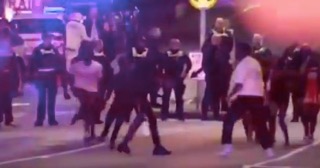Anthony Albanese has made larger-than-expected changes to his frontbench in an effort to put his best athletes on the field for election season.
But the results of a long-running ANU study show the depth of trouble his government increasingly finds itself in.
It shows Australians have only a marginally higher level of confidence in the Albanese government than they did in the Morrison Coalition government in its last year, a result that goes some way to explaining the political temperature and the way the prime minister approached his new frontbench configuration. More on that remarkable study later.
Reshuffles tell you where the government sees its vulnerabilities and how it intends to tackle them.
Albanese has gone much further than expected to refresh and energise his government in two hot-button areas — immigration and housing.
Immigration under the spotlight
Immigration has long been seen as a poisoned chalice and a vulnerability for Labor. Now, Andrew Giles is the latest minister to be dumped out of the portfolio. The PM had resisted this, wanting to deprive Peter Dutton of a political win, but political pragmatism has prevailed.
Ultimately, the assessment was made that the portfolio needed a shake up, not that Albanese conceded that point in his press conference, where he accused Dutton of being “negative” and rejected the assertion that his ministers had failed.
Now Andrew Giles moves to minister for skills and training — he remains a minister but is no longer able to be targeted by the opposition in the same way.
Tony Burke is the big winner — taking on home affairs along with immigration and multicultural affairs, cyber security, the arts and leader of the House. It is a massive load — but it means the immigration portfolio is now in cabinet and has one of the most senior and experienced government prosecutors in charge.
This is a massive vote of confidence in Burke and allows him to tackle, head on, the broader immigration barnacles and concerns around big immigration numbers. Matt Thistlethwaite becomes assistant minister for immigration to help — but ultimately the buck will stop with Tony Burke.
There will be changes to the supersized home affairs department, with ASIO moving into the attorney-general’s department. It demonstrates that confidence in this mega department is eroding — with calls for a restructure.
Labor tackling its housing woes
The dumping of Clare O’Neil out of home affairs has already caused some grumbles, with some believing she has been unfairly punished despite what is seen as a broadly good performance.
But she remains in cabinet and has now moved to minister for housing and homelessness — a portfolio that needed a stronger communicator at a time when anger about housing is at record highs.
The government believes the housing portfolio needs its strongest, sharpest public performer since the housing debate has been largely lost by Labor so far.
Now, O’Neil is responsible for taking on the Greens on the left and the Coalition who have zeroed in on the frustration among particularly younger Australians who are ropeable they are being locked out of what was once the great Australian dream.
Julie Collins moves from housing, a role where she was struggling to land a hit, but remains in cabinet taking on agriculture, fisheries and forestry and retaining minister for small business, a role that is never the main game for a Labor government.
Plibersek ignored again
There are other changes, less significant, but they tell other stories about where the government sees the future.
If you want Australia to be one a republic you can forget it for a while — the prime minister has scrapped the republic as a portfolio. After the loss of the voice referendum there is zero appetite to fight another referendum.
There will be criticism of Albanese for not being bolder — with Tanya Plibersek who is widely seen as one of the best performers remaining in the environment portfolio. Some insiders believe that her talents are being wasted and are critical of Albanese for failing to promote her.
When prime ministers want to reward people but have no open positions in the ministry they often invent new positions of “envoy” to keep strong performers languishing on the backbench happy.
Albanese appointed three: Peter Khalil, who is being targeted by anti-war protesters, as special envoy for social cohesion to try to tackle the rising anger and fragmentation in the community; Luke Gosling becomes special envoy for defence, veterans’ affairs and northern Australia; and rising star Andrew Charlton becomes special envoy for cyber security and digital resilience.
ABC News

